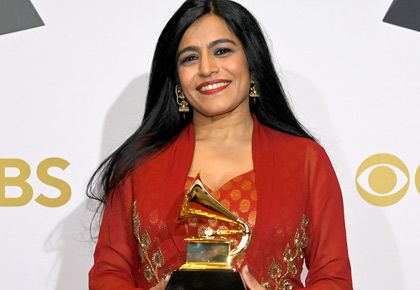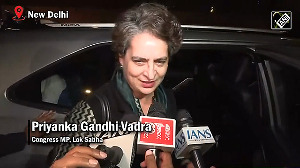'A Colourful World is for every child, telling them that like the different coloured crayons in a box, they should also appreciate their differing identities, shine and live peacefully with other human beings in our colourful world.'
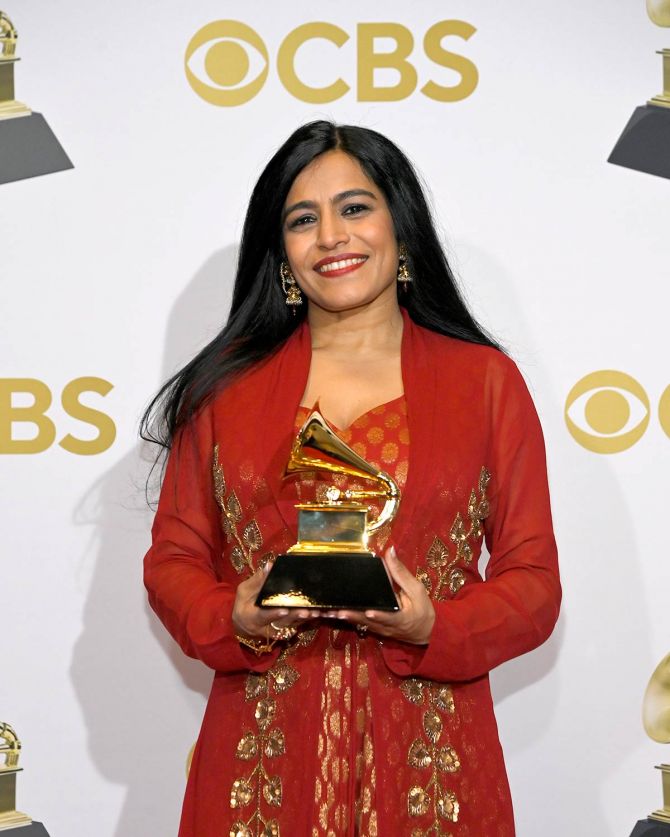
It's been a great start to the year for Falguni Shah, who goes by the stage name Falu, as she bagged a Grammy for A Colourful World, which was voted Best Children's Album.
That has made her the only singer of Indian origin to win in this category.
Falu has been singing since she was three years old.
She rigorously trained in the Jaipur musical tradition and the Benaras style gayaki under the 'Nightingale of Gujarat' Kaumudi Munshi, who was a disciple of the 'Queen of Thumri', Siddheshwari Devi, and herself was famous for her Sugam Sangeet. She also learnt semi-classical music and Gujarati folk from Kaumudi's son, Uday Mazumdar.
She continued her tutelage under Ustad Sultan Khan, the renowned sarangi player and classical vocalist of the Sikar Gharana. The maestro was also one of the founding members of the Indian fusion group, Tabla Beat Science, with Ustad Zakir Hussain and Bill Laswell.
Another legendary vocalist of the Jaipur Gharana, Kishori Amonkar, was also one of Falu's gurus.
In a telephone conversation from the US, Falu tells Rediff.com Senior Contributor Roshmila Bhattacharya, "I have been singing since the age of three, but never ever had I imagined that I would one day give a voice to my nation."
It must have been a proud moment for you when Prime Minister Narendra Modi acknowledged your historic win at the Grammy Awards with a congratulatory tweet, to which you responded saying this award is for India.
I was born and raised in India, and back home, we look up to our leaders.
So when the PM tweeted, I had to sit down.
I was soaked in happiness of the most divine kind.
I have been singing since the age of three but never ever had I imagined that I would one day give a voice to my nation.
I felt incredibly lucky holding the Grammy in my hands, and kept asking myself, 'Is this really happening?'
I'm grateful to God and our PM, the blessings of my teachers and my elders, to my fellow Indians who have always given me only love, and my Colourful team for this recognition.
People from across the world came together to make this album happen and then, to be recognised by your own country, it makes me feel not just ecstatic but supremely honoured and truly humbled.
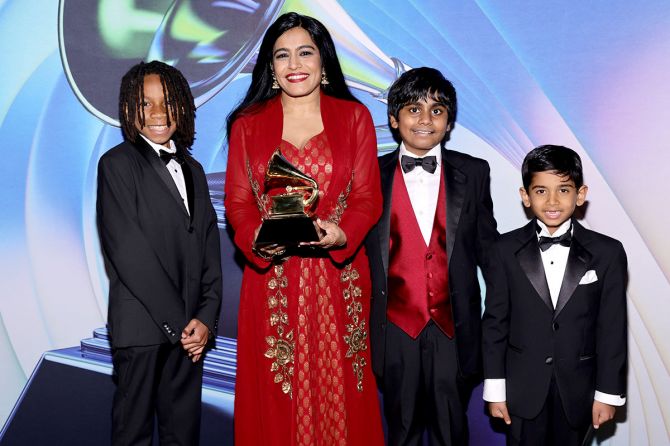
A Colourful World is a follow-up to your 2018 Grammy-nominated album Falu's Bazaar. Take us through the journey of these two albums.
My husband Gaurav is a doctor and also a musician. He's a part of both albums.
We met at Ustad Sultan Khansahab's house when he came there to learn music.
So obviously, in our own home, there's music everywhere.
We write music together, sing together and perform together.
Falu's Bazaar happened because we have a child, a brown kid going to a New York City play school.
When Nishaad was around four, he started asking questions like, 'Why am I brown? Why do we speak Gujarati and not English at home? Why is our food yellow? Why do we count numbers differently?'
As a mother, I soon ran out of ways of telling him that he should not be afraid of his 5,000-year-old heritage that makes him different, rather he should embrace it proudly.
That's when I started writing songs for him, in two languages, talking about everything from our Indian spices like haldi, jeera and mirchi to our numbers and our pots and pans like tawa, kadhai and yes, the belan.
That's wonderfully creative and innovative…
(Laughs) Well, that was the beginning of my journey as a songwriter for kids which is an acquired skill because to write for children, you have to become a child yourself.
There's a saying that when a child is born, a mother is born.
My son and I were born at the same time.
I was a singer and a young mother trying to pass on this generational knowledge to my child.
Falu's Bazaar was written for Nishaad, but A Colourful World, a 12-song album, is for every child, telling them that like the different coloured crayons in a box, they should also appreciate their differing identities, shine and live peacefully with other human beings in our colourful world.
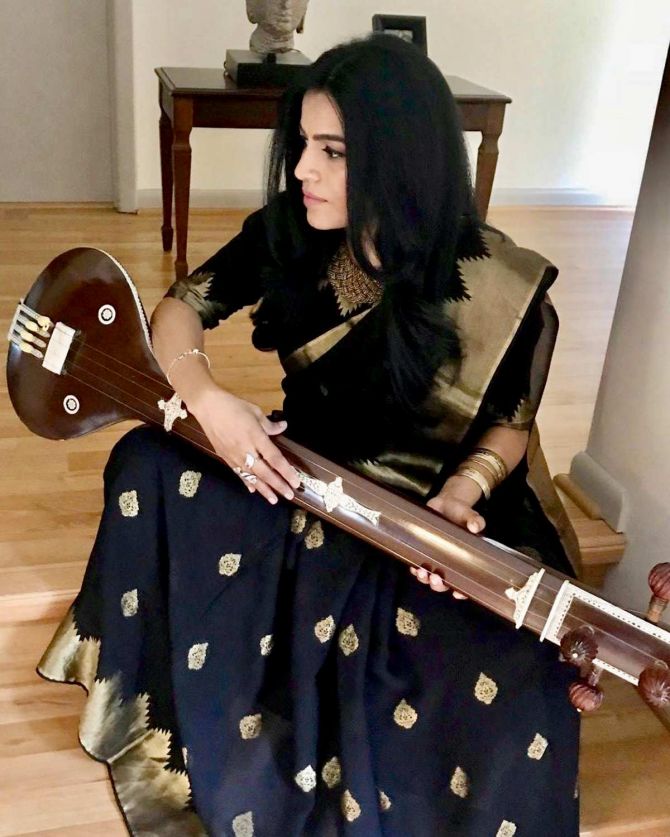
The last couple of years have been very difficult for children across the world because of the pandemic, the effects of global warming and now, an ongoing war. What kind of a world do you dream for them today?
Less CO2 and more electric vehicles, so there is less pollution and they can breathe fresh air.
I want them to embrace progress, go to space, take the human race to the next level, but with love and without wars.
I pray for a peaceful planet keeping all the gifts nature has given us... A peaceful, tolerant, appreciating and accepting world.
How difficult was the pandemic for your family and you?
I enjoy talking to people, but I'm very reserved and like to live by myself, questioning everything I do, so the pandemic was the most beautiful time of my life.
I could create music without leaving my home and studio.
I had plenty of time for soul-searching and self-analysis and wrote and composed so many songs during this time.
I also got to spend a lot of time with my family and passed on the Indore gharana and the Jaipur gharana to my child.
Nishaad is learning classical music, we have been doing the chilla together, 40 days of singing one-stop, non-stop.
I practised for 16 hours a day, he did four because he's still only a child.
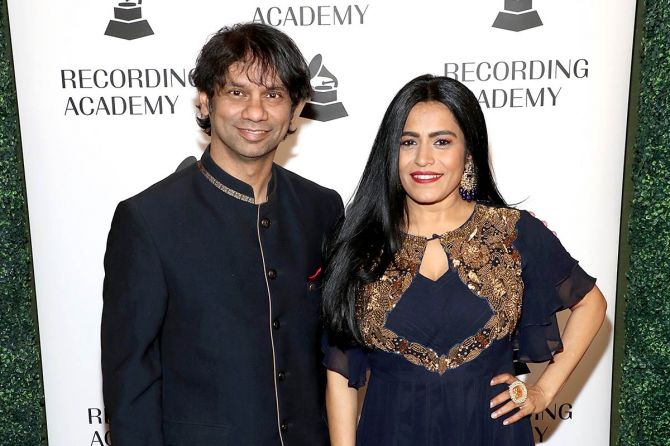
We had another Grammy winner from India this year, Ricky Kej, who bagged the trophy for the second time, along with Stewart Copeland, for Divine Tides in the Best New Age Album category. What did you say to each other after your big wins?
We were sitting in this huge room, me on the left, Ricky to the right.
We waved to each other, but did not have the chance to say, 'Hi, congratulations.'
Once you win, you are whisked off to the media room to deal with the press, so though our paths crossed, we didn't get to interact that evening.
But I texted him. He is my friend on Facebook.
You have carved a niche for yourself with your distinctive Indie Hindi style, a melding of Indian classical and contemporary, that has become your brand identity. How did it evolve?
I came to America as a classically trained Indian vocalist.
But if you want to sing in English, you have to do it in an authentic way.
So I went back to school, picked up some writing composition and American vocals. Then I drew freely from both cultures.
My songs may be in English and written the American way, but all of them are based on ragas, our folk tradition, the Benaras style thumri because that's where my roots are.
That's why it's called Indie Hindi because no one else does it.
(Laughs) Everyone at the Grammys loved the term.
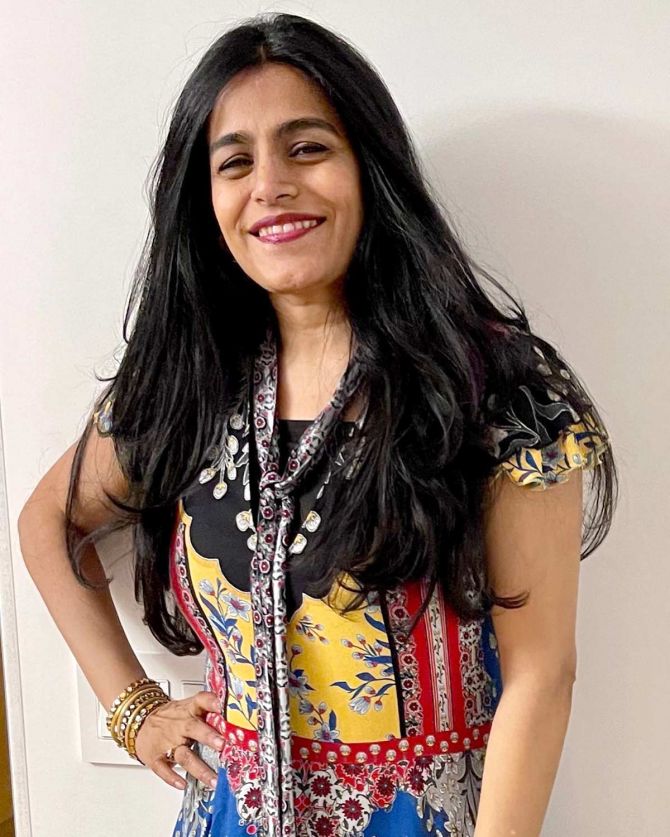
In 2013, your album Foras Road, which had lyrics in seven South Asian languages, instruments ranging from the shehnai to the dobro and musicians from across the world was also shortlisted for the Grammys, but didn't get nominated.
Since the age of three, I've studied dhrupad, dhamar, khayal and thumri.
My original Banaras gayaki training happened at Kaumadi aunty's house and while I was trying to embrace my roots, I heard of Foras Road, the oldest red-light district in Mumbai which still preserves knowledge of our amazing Indian classical music tradition.
When I came to America, I wanted to share with the West how beautifully the courtesans had saved our gayaki after the British invaded us.
Foras Road is a respectful tribute to these courtesans and their disciples whose music we now share with the world.
Earlier in 2007, you collaborated with Wyclef Jean, lending your distinctive vocal style to Angelina Jolie's experimental directorial debut, A Place In Time. What was that experience like?
That was fun!
I was new in New York then, it had been just four years since I had come from India, and I got this call from Wyclef Jean and Jerry Wonda of the band Fugee and was told to show up at the studio in half an hour.
I didn't know much about Hip Hop music and was clueless about what they wanted from me.
When I turned up at the studio, I was told to go into the recording booth and do my thing.
I was wondering what this was all about when suddenly, on a huge screen, I saw Angelina Jolie and Brad Pitt and I was like, 'Excuse me, but what am I doing here?'
I was told to continue singing my alaaps, which were included in the soundtrack.
I'm amazed at how spontaneous the producers are, inspiring us and taking the best from us.
My husband Gaurav also sang for the project, he for Brad and me for Angelina, we were two husband-wife teams in perfect sync.
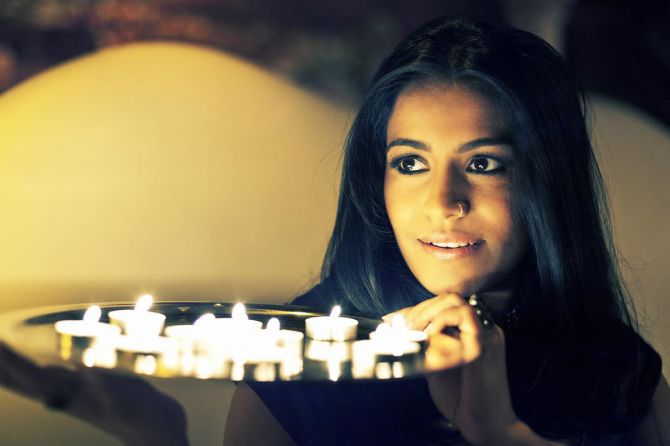
Did you meet Angelina and Brad?
No, they were in LA, we only sang for them.
What next?
We have been receiving a lot of offers, but it's too early to say what we will end up doing.
There are lots of hopes and dreams, plans to collaborate with different composers and artists, from India too.
We want to go back home, do some meaningful, ambassadorial work, and show the youth that music is a great healer.
Hopefully there will be lots of collaborations, soundtracking, licensing…
Any Bollywood offers?
There are a couple and if they work out, you guys will get to hear us back home.
How about a song on the pandemic that people can listen to 50 years from now and understand what life was like being locked up in our homes by a pesky virus?
It's already written and made. We have yet to release it.
